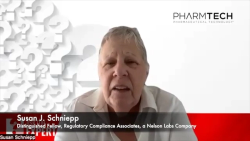
OR WAIT null SECS
- About Us
- Advertise
- Contact Us
- Editorial Info
- Editorial Advisory Board
- Do Not Sell My Personal Information
- Privacy Policy
- Terms and Conditions
© 2026 MJH Life Sciences™ , Pharmaceutical Technology - Pharma News and Development Insights. All rights reserved.
Back to the Future: Does Anything Change, Ever?
Pharmaceutical Technology Europe
This month, readers are offered the opportunity to take part in a quiz. How many predictions from an old blueprint for the European pharmaceutical industry were correct? Remember, no cheating.
Every new year offers a moment to look briefly forwards and backwards; and, just before the end of last year, a happy chance wafted a document across this columnist's desk that provided some interesting festive season food for thought. It is a vision of the future of the European pharmaceutical industry - but a vision of the 21st century that comes from the past.
So, to provide readers of this column with a sense of seasonal fun, you will have the opportunity to decide for yourselves to what extent the predictions were right or wrong. And as an esoteric pharmaceutical quiz, you can also have a guess at when the predictions were made and by whom. It contains plenty of clues and, in the spirit of seasonal goodwill, some of the answers appear at the end of this column. Some of the key passages from the document are presented below.
Patents and authorizations
"Let's look at what the pharmaceutical industry in Europe may be faced with after patent term restoration; after a European marketing authorization system has been set up; after the single market has 'harmonized' information and advertising; after some experience with transparency regarding pricing systems; and after some reshaping, perhaps, of the European political map and the political economy. Will the principal preoccupations have changed by 2000? Not profoundly, I think. The current wave of European legislative measures will have subsided, but in themselves these changes will have had a marginal rather than a fundamental influence."
"Patent term restoration will certainly bring some relief for some products (but not many - and in most cases will only be effective from the beginning of the next century, when patents start to expire on the first products to benefit fully). It will, perhaps, have given some upward lift to research and development (R&D) investment confidence among the companies that depend most heavily on European sales."
"But the perceived advantages for industry are likely to bring increasing calls from industry opponents (they have already begun) for tighter controls on industry, including controls on prices or on the allowable cost elements such as marketing or information; generic or therapeutic substitution; or intervention in the direction of research programmes and priorities . . ."
"A European marketing authorization system may bring faster registration for some products, quicker pan-European access for more products, greater certainty concerning procedures and reduced costs in duplication of registration activity . . . But not all that much, and not all that soon. On the negative side, we will suffer some reduced flexibility regarding registration, and greater risks from increased parallel imports and the export of lowest prices to higher-priced countries . . . In addition, we are, in my opinion, going to see in any event a bigger part played by centralization, and the European Medicines Agency is one more step along this road. "
"Increased transparency regarding national pricing systems may bring us some weapons to attack abuses - but how quickly they will work is a very open question. And at the same time, as a by-product of the transparency directive, the European Commission is steadily building up a network of centralized activities covering transfer pricing, therapeutic categories, national pricing and reimbursement systems - to say nothing of the data bank -- and whatever else may be introduced."
Advertising and legislation
"How different will our information and advertising practices be in 10 years time? Certainly there will be a greater degree of information and advertising coherence from country to country - but much of this will spring not so much from controls as from increased coherence of marketing authorizations and marketing strategies."
"Where the biggest threat to industry self-determination may lie is perhaps that current efforts at control will lead later to the imposition of financial controls, ceilings of some sort on promotion or, worse still, a levy to finance some form of 'neutral' or 'independent' information. How far will other legislation continue to increase controls on our industry? There is no doubt that the environmental/consumer/social policy trend is still gathering strength. How far will it exact further costs from the pharmaceutical industry in Europe - in terms of cancelled research investment in threshold technologies, added costs of regulation of dubious value, or juridical uncertainty from conflicting regulation?"
"More generally, are there likely to be dramatic changes in how health care spending and social security cover develop in Europe? Will Europe's economic dynamo generate enough energy to provide expensive medical technology in greater volume for the increasingly elderly population? And if spending does increase, how far will the pharmaceutical industry be able to demonstrate that its products, even when expensive, can provide net gains in health care spending? Or will economic growth lag behind and become swamped by greater demands for high-volume social provision? How far will the demand shift towards low-cost rather than high-value health care?"
"How will the integration of eastern Europe into western Europe and the western world market economy affect conditions? Who is going to pay to raise health care standards in eastern Europe? It could mean bigger demands for pharmaceuticals, but who will supply them? And will demand be for generics or innovations? If, for instance, eastern European economies do grow, it is not only their demand for pharmaceuticals that will expand; so too, inevitably, will their production. How will that affect current suppliers? It's relatively easy to make a list of questions. What about some answers? Generally, I believe the fundamentals will remain the same: demand for pharmaceuticals will continue to grow."
Requirements and politics
"But the combination of pressures during the next decade may see a consolidation among health care purchasers and regulators, leading to increased requirements imposed on the industry, such as need clauses; a focus on efficiency; medicine-acquisition practices favouring generic and therapeutic substitution; and price premiums permitted only for therapeutic advantage . . . It is more than likely that cost/benefit considerations will become attached to marketing authorization requirements, with the risk of placing massive and costly demands on industry to conduct additional wide-ranging epidemiological studies as a part of preregistration procedures. But much of the way those pressures will operate is still open to influence."
"There could be a net gain out of all these changes in external circumstances for the European pharmaceutical industry. But it might only be slender. It could even be cancelled out completely if the price of patent term restoration proves to be more controls on research, if opening the internal market leads to unchecked parallel importing, and if tighter health insurance budgets lead to tighter cost control mechanisms . . . Much will depend on the decisions made in 'political' circles."
"For instance, how far will European health care budgets squeeze pharmaceuticals? Will the industry be able to demonstrate product value in a way that convinces the critical, sceptical, sophisticated audiences of health care providers and government departments, centralized European control agencies, increasingly influential consumer lobbies and maybe even patients? Will we be able to divert health care purchasers and users from insisting uniquely on short-term value for money? Will the industry successfully persuade national and European authorities that there is more at stake in completing the internal market than merely ensuring free circulation? Or how, in Europe, will the battlegrounds shape up regarding generics (with respect to bioequivalence), confidence concerning the reliability of submissions and of their evaluation, and legitimate strategies to maintain commercial protection for off-patent products?"
"I believe that the future is still up for grabs. And for that reason, much of the fine-tuning, the way that the marginal changes affect the industry, will depend on how well the industry as a whole plays its own political cards. Insensitive handling will become an expensive mistake. The industry as a whole must make up its mind which card game it wants to be in; political coherence can come only from political cohesion, from a sense of political identity.
"Equally, it's no good discussing any of the major trends or key issues as if Europe, the European pharmaceutical market and the players in it were somehow fixed and unchanging. This background is quickly changing and it requires a response from individual companies. Each will find its own form of response - some have gone for mergers. We have already seen some notable examples of supply-side consolidation; I don't need to list the major (and not so major) mergers effected or announced during the last year or so. "
Size doesn't matter
"Are there any alternatives to the strategy of 'biggest is best'? I believe there are, because no matter how many European directives we see during the next decade, the way medicines are viewed, prescribed and taken will continue to vary from country to country. So there are no universal solutions, even for the largest firms and biggest products."
"What successful companies in Europe will have to do, whatever their size, is adapt their structures to get the best of both worlds. They must ensure that they are not operating at a disadvantage to newly established firms that are tailored to the new European single market. However, any adaptations must still allow them to continue benefiting from local knowledge."
"Whichever way firms set about dealing with the new challenges presented by the 21st century, there is no pretending that there will not be some pain. There are financial and human costs in restructuring, with concentrations, lay-offs and compensation payments. There are also costs from tougher competition - will it lead to an increase of unedifying inter-company conflict?"
"Companies may change products to take maximum advantage of competitive circumstances - more cross-licensing, for instance. Or, more involvement by research-based generics firms - bigger generic demand, tighter regulation of the generic sector and higher generic prices could together amount to an attraction."
"Whichever way things go in Europe, it is a Catch 22 situation. If operating conditions get worse, the industry will suffer. If they improve, it will attract more players and competition, so the local industry will suffer. The chances of success depend on the extent to which we can ensure that all our companies are successful, not only in generating valuable new products, but also in seeing with a clear eye that their way ahead depends on continually fighting for a better environment in which to operate. And just as you don't discover valuable new drugs without a lot of hard work and commitment, you don't get good results in the operating environment unless you work at it."
Answers on a postcard, please
How did you do? Not too hard to identify the year - 1990, just after the EU rules came in to restore patent terms and to impose minimum requirements on the way member states operated their pricing and reimbursement systems, and just before the proposals for the European Agency for the Evaluation of Medicinal Products were finalized.
Not too hard to identify what was right in the predictions, either - tougher competition, tighter pressure on prices and promotion, clashes concerning intellectual property rights -- in fact, all the same stuff about a better operating environment that the European pharmaceutical industry is still having to say today.
And as to the 'whom' - it was the then director general of the European Federation of Pharmaceutical Industries and Associations (EFPIA), Nelly Baudrihaye. Characteristically, she added at the end of her speech: "There are certain privileges attached to age. In my case, one of them is that I can speak authoritatively on this subject, secure in the knowledge that you won't be able to put me on the spot on 1 January 2001 to accuse me of having got it wrong." Right, Nelly.



